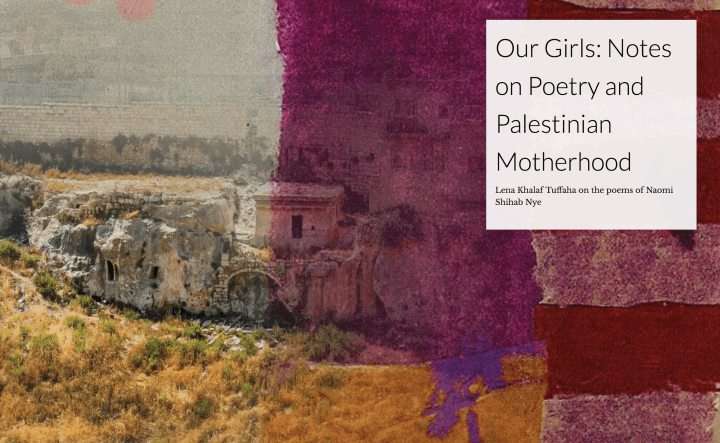
Our Girls: Notes on Poetry and Palestinian Motherhood
September 16, 2019
This essay is part of a series in which Poetry Northwest partners with Seattle Arts & Lectures to present reflections on visiting writers from SAL’s 2019/20 Poetry Series. At 7:30 p.m. on Thursday, September 19, Naomi Shihab Nye will read in celebration of her new collection The Tiny Journalist at Town Hall Seattle, and Lena Khalaf Tuffaha will moderate the Q&A with Nye. Get tickets.
By Lena Khalaf Tuffaha
1. Warning: Rough Edges Ahead
In middle school, my eldest child had a homework assignment about the Palestinian-Israeli conflict. It was a fill-in-the-blank worksheet, and had my daughter completed it according to the choices available, would have her required her to say that Palestinian refugees simply left their homes in 1948. After a painful evening of unpacking this language, in class the next day she suggested to the teacher that the worksheet didn’t reflect her family’s experience. The teacher’s response was to draw a line down the middle of the board, to write the words “Israeli” and “Palestinian” on either side of it, and to ask her to speak on behalf of Palestinian history. At age 12.
Most Palestinian-Americans have a story like this. A story of the day they were deputized by American adults into the role of spokesperson for—depending on the decade or the news cycle—Palestinians, Muslims, the Arab World, the Intifada, the Palestinian Authority, Hamas. It happens as early as the classroom, the school bus, or the playground. Elected officials running for president recycle the racist trope that we don’t exist, an occupation and its attendant wars rage on, and the US media keeps us simultaneously very present and profoundly invisible in the American imagination. In this landscape, discovering a Naomi Shihab Nye book at the library or on a bookstore shelf is one of the most healing and humanizing experiences. If a “normal childhood” is the prayer, Nye’s poetry is our Hallelujah.
No one taught me her words. I found Nye’s books on my own, in the pre-Google era. My eyes fixed on the name Shihab—that shooting star—among the words on the bookshelf where I expected no Arabic words to appear. When I pulled the volume off the shelf, the cover image of a Palestinian fallaha in her richly embroidered thobe and white veil transfixed me. As did these lines from the title poem of the book Words Under the Words:
Answer, if you hear the words under the words—
otherwise it is just a world with a lot of rough edges,
difficult to get through, our pockets full of stones.
2. Grace in Our Brokenness
This summer we drove to Portland to hear Palestinian teenage journalist Janna Jihad speak. She was touring the US with the help of a South African organization to raise awareness about the apartheid Palestinians endure. The trip was a birthday gift for my youngest daughter who is a huge Janna fan. When I handed her Naomi Shihab Nye’s new book, The Tiny Journalist, inspired by Janna’s life and work, she settled in and read it cover to cover. “Let’s check on Janna,” she’ll say from time to time, asking to view Janna’s Instagram account from my phone. When she got to meet her at the lecture, she was overwhelmed, blushing through Janna’s compliment: “I love your kuffiyeh!” and later chiding herself for losing her words.
In The Sound of Listening: Poetry as Refuge and Resistance, poet Philip Metres writes: “Poetry is not a mere throwback, some atavistic practice for the vestigial few. On the contrary, poetry’s discipline of entering into our minds and bodies—our restless bodies, our roiled souls—is an ancient practice that invites grace to enter our brokenness, to hold us together, to wake us again.” I was thinking about daughters as I entered the church where Janna spoke. I was thinking about Ahed Tamimi, Janna’s cousin who survived interrogation and eight months of incarceration for resisting the Israeli military’s incursion on her home. I was thinking about Rachel Corrie, a Pacific Northwest daughter, who was mowed down by an Israeli bulldozer as she tried to stop a home demolition in Rafah in 2003. In “Israelis Let Bulldozers Grind to a Halt,” Nye demonstrates the speaker’s palpable frustration and disappointment:
“Deadline for demolition”
as if cruelty had its own calendar
a banker or a businessman.
I return to the possible definitions of grace as I consider the poem, which include: “simple elegance or refinement of movement.” The poem does just that, it moves elegantly, and with a grace that is characterized by an economy of words, short sharp lines, and a trust in the power of the list. These are refinements of language that poets spend a lifetime perfecting. Neatly designed and arranged, they imbue the speaker of the poem with both lucidity and plain-spokenness. Another possible meaning of “grace”: to do honor or credit by one’s presence. The speaker continues: “I am mad about language/covering pain/big bandage/masking the wound.” The poem is not a detached or charitable act of witness, it has vital work to do—to honor by seeing and saying fully what it sees, to be entirely present. The apparent simplicity of the statement gives way to the capaciousness of the utterance, the concision with which so much landscape, literal and figurative, multiple generations and heritages of pain, are evoked. The wounds in the room are singing, but so is the beautiful resilient hope of our girls. This book, with its Janna-persona poems and direct address and insistent elegance is a book by one of and for our girls.
Read more on Poetry Northwest.